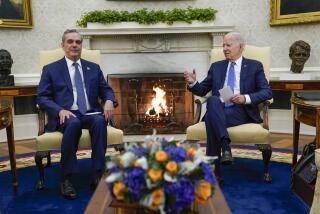U.S. Cool to OAS as Forum on Latin Debt : Treasury Secretary May Send Aide to Economic Council Session
- Share via
WASHINGTON — The United States put a damper Tuesday on the first meeting in 17 years of the Organization of American States’ economic council by describing the upcoming session as an inappropriate arena for discussion of the mountainous Latin American debt.
“We don’t believe such a discussion is needed,” a Treasury Department spokesman said. He said that Washington is satisfied with the “current forums” such as the International Monetary Fund and the World Bank.
The economic council meeting, scheduled for June 29-30 at OAS headquarters here, would be the first since 1970 convened to address economic problems in the hemisphere.
Equal-Weight Voting
The council chairman, Peruvian Vice President Luis Alva Castro, told reporters that he hopes the top financial policy makers of all 31 member countries will attend. A Treasury spokesman said, however, that it has not yet been decided whether Treasury Secretary James A. Baker III or a lower-level official will represent the United States, the leading creditor nation.
The United States in the past has preferred to discuss the debt issue in international forums where voting is weighted in relation to the members’ financial contribution to the sponsoring group. This generally gives control to industrialized nations. In the OAS, each member nation has an equal vote.
Alva, in a news conference, pleaded for full U.S. cooperation. He emphasized that he is seeking a “political dialogue” and warned members that the meeting must not become a “confrontation” with the United States over debt repayment.
“Creditors have met and debtors have met, and it seems to me that this one legitimate organization of Latin America, the Caribbean and North America should be the best forum for this discussion,” Alva said.
Willing to Reschedule
The Latin nations’ debt is now $381.8 billion. U.S. officials have indicated a willingness to discuss rescheduling payments but have resisted calls for forgiveness of portions of the debt or interest.
Alva pointed out that at the time of the last economic council session, the Latin American nations owed only $27.5 billion.
He said that some agreement must be reached on how to strengthen the debtor nations’ economies. The Latin countries all suffer from a chronic imbalance between relatively low world market prices for the primary commodities they export and the high prices of products from the industrialized world, he said.
“Our capacity to pay is disappearing,” Alva said. He added that “protectionist policies” of many creditor nations are barring Latin export products from their usual markets. “It is not that we don’t want to pay our debts,” he said. “It’s that we have no means.”
Defends Decision
Alva defended Brazil’s decision earlier this year to suspend all payments on its $80-billion debt, the largest of any of the Latin nations. Alva said he did not wish to anticipate the outcome of the June discussions of that action, but added:
“Brazil had to do it. We recognize it and respect it and give our all-out support.”
More to Read
Sign up for Essential California
The most important California stories and recommendations in your inbox every morning.
You may occasionally receive promotional content from the Los Angeles Times.










